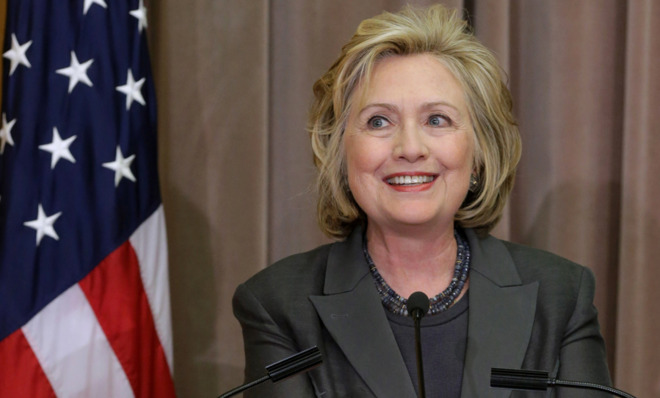How Hillary Clinton can be a populist without scaring off Big Business
When it comes to fighting income inequality, what's good for workers is often good for corporations, too


A free daily email with the biggest news stories of the day – and the best features from TheWeek.com
You are now subscribed
Your newsletter sign-up was successful
Income inequality is fast becoming the top domestic issue of the nascent 2016 presidential campaign, and Hillary Clinton is searching for a winning message on the issue.
Tucked among tea-leaf interpretations of her Midwest travel plans and yoga regimen, The New York Times reported that she has "talked to friends and donors in business about how to tackle income inequality without alienating businesses or castigating the wealthy."
While this could be seen as the latest in a long line of shady Clintonian triangulations, it actually gets at a longstanding Democratic dilemma over whether to make big business the enemy or catalyze the private sector to support liberal policy objectives. Elizabeth Warren, the populist Democratic senator from Massachusetts, says the game is rigged. But Clinton seems more disposed to tweak the game in certain areas, rather than tear it down.
The Week
Escape your echo chamber. Get the facts behind the news, plus analysis from multiple perspectives.

Sign up for The Week's Free Newsletters
From our morning news briefing to a weekly Good News Newsletter, get the best of The Week delivered directly to your inbox.
From our morning news briefing to a weekly Good News Newsletter, get the best of The Week delivered directly to your inbox.
We shouldn't be too quick to blast this instinct as plutocratic cronyism. It's politically prudent to avoid making legislative enemies of powerful stakeholders. But it's even wiser to give business a stake in fighting inequality. And luckily for Clinton, there is a path to combating inequality that would benefit workers and business alike.
Clinton is already tacking toward a political sweet spot on the issue. Taking the global perspective of an ex-chief diplomat, she framed inequality as an issue of basic national well-being in a speech in May. "As secretary of State," she said, "I saw the way extreme inequality has corrupted other societies, hobbled growth, and left entire generations alienated and unmoored."
The private sector similarly sees inequality as a real long-term problem that jeopardizes its interests. As Elizabeth Bruenig recently pointed out in The Week, a report from the Harvard Business School warned that "in the long run, American business will suffer from an inadequate workforce, a population of depleted consumers, and large blocs of anti-business voters."
This gives business common cause with Americans struggling to get by. Among average Americans, much of the anxiety about inequality is really anxiety about stagnant incomes, not about launching a class war. It has been a lost quarter-century for the middle class, as the real median income has barely budged since the 1980s.
A free daily email with the biggest news stories of the day – and the best features from TheWeek.com
There happens to be a host of ways we can give people greater economic security. And these reforms would be mutually beneficial, both putting money in people's pockets and improving our pro-growth economic climate.
For instance, providing greater support for families with children would help ease their financial pressures. A federal paid family leave program would save the vast majority of workers from losing wages while caring for a new child. Stronger government support with child expenses, daycare, and early childhood education would similarly help parents and relieve financial stress while promoting child development.
For their part, businesses would keep workers who could exit the workforce altogether in the face of prohibitive child-care costs. This is good for employers, since they would retain valuable employees and avoid needless training costs.
Social insurance often provides a third-way alternative to both laissez faire acceptance of rising inequality and heavy-handed regulation to counteract it. Unemployment insurance, for instance, is a public alternative to severance pay. And the Earned Income Tax Credit boosts eroding market wages without a regulatory mandate on business, like a higher minimum wage.
But these programs must be updated to meet the market's modern inequalities. We should make unemployment benefits more generous and more readily available, recognizing that bouts of joblessness are a product of the economy, instead of blaming it on slackers who "just want to sit around," as Speaker John Boehner (R-Ohio) recently put it. And there are already proposals from both sides of the aisle to let the EITC provide more support to more people more regularly.
These government interventions are investments, not entitlements — and they're smart ones at that. Our economy gains when more people are economically secure. They generate more economic activity and gain new flexibility to join innovative start-up companies or become entrepreneurs.
Government investments in young children, in particular, are thought to save huge sums of money in the long run. Economist James Heckman estimates that investment in early childhood education yields a 7 to 10 percent annual rate of return to society — a view endorsed by former Fed Chairman Ben Bernanke. Every $1 spent on early education produces as much as $12 in long-term savings by increasing lifetime earnings, reducing future social welfare usage, and avoiding criminal justice expenses.
Fighting inequality both protects individual security and shores up our fiscal future. This makes intuitive sense: the health of our consumer-driven economy will always rest on the state of working- and middle-class families.
Clinton can tackle inequality without alienating business. If economists like Thomas Piketty are right that growing inequality is an inevitability of 21st century capitalism, then good policy will seek to preserve the vibrant upside of our economy while cushioning against its predictable dislocations. When it comes to curbing inequality, what's good for Americans is good for business, too.
Joel Dodge writes about politics, law, and domestic policy for The Week and at his blog. He is a member of the Boston University School of Law's class of 2014.
-
 Why are election experts taking Trump’s midterm threats seriously?
Why are election experts taking Trump’s midterm threats seriously?IN THE SPOTLIGHT As the president muses about polling place deployments and a centralized electoral system aimed at one-party control, lawmakers are taking this administration at its word
-
 ‘Restaurateurs have become millionaires’
‘Restaurateurs have become millionaires’Instant Opinion Opinion, comment and editorials of the day
-
 Earth is rapidly approaching a ‘hothouse’ trajectory of warming
Earth is rapidly approaching a ‘hothouse’ trajectory of warmingThe explainer It may become impossible to fix
